Forest certification is a voluntary environmental process. It leads to independent certification by an internationally recognised certification body that confirms that an area of forest is managed to a defined standard.
It is proof of sustainable forest management (SFM), which is the stewardship of forests to meet economic, environmental and social needs.
Certification is endorsed by two international independent organisations:
Programme for the Endorsement of Forest Certification schemes (PEFC).Forest Stewardship Council (FSC).Certification doesn’t stop at the forest, but applies throughout the forest supply chain, including timber processing, manufacturing, printing and other users of wood.
The main reason for the introduction of certification was to encourage countries around the world to practise SFM especially in the tropics
These receive chain of custody (CoC) certification but they must be able to prove that the timber originated in certified forests.
CoC certification allows them to stamp their products with the PEFC and/or FSC brand. This is proof that products were sourced in sustainably managed forests. The main reason for the introduction of certification was to encourage countries around the world to practise SFM especially in the tropics – including Brazil, where illegal logging is still carried out.
CoC certification is important for Irish wood processors, as these rely on exports. PEFC and FSC stamps are recognised as international marketing as well as environmental brands.
Irish timber processors can receive CoC certification providing at least 70% of their timber is sourced from certified forests. As most timber up until recently was supplied by Coillte – which has certification – there was little incentive for small-scale forest owners to seek certification.
CoC certification is important for Irish wood processors, as these rely on exports
Other major suppliers such as Northern Ireland Forest Service and the Irish Forestry Unit Trust (IForUT) also have certification.
Now, some mills who are at the 70% threshold, can no longer accept non-certified timber if they wish to maintain CoC certification. Forest owners who wish to gain greater market access to CoC certified mills are faced with a major challenge, as they don’t have the economies of scale to achieve certification, which is costly.
There are, however, two cost-effective ways to achieve certification:
Opt for group certification under the aegis of a woodland co-operative or producer group. Opt for certification with a forestry company.Owner group certification
In 2016, the Forest Service invited tenders to begin the process to of achieving group certification.
The North East Forestry Group, based in Meath and the Forestry Owners Cooperative Society, in Cork, took part in a pilot project and achieved certification in 2018. However, retaining certification is proving difficult.
Forest owners who wish to gain greater market access to CoC certified mills are faced with a major challenge, as they don’t have the economies of scale to achieve certification
The North East Forestry Group has retained certification for the 2019/2020 season, but it is likely that the Forest Service will need to fund certification programmes beyond the initial pilot scheme.
Alex Kelly, manager, Irish Wood Producers (IWP), acknowledges the need for group certification.
“We are currently developing plans to work towards certification this year as an increasing number of our sawmill and renewable energy customers require timber from certified forests.”
Group company certification
Group company certification schemes (GCSs) are run by forestry companies that manage and market timber for forest owners.
They have the economies of scale including forester staff to administer group schemes around the country.
Some are already managing forests for individual forest owners or companies including Forestry Services Ltd and Arbor Forest Management Ltd. Both have the advantage of providing marketing and certification expertise.
FSL receives dual PEFC and FSC certification
Forestry Services Ltd (FSL) is the first private company to achieve both FSC and PEFC certification in Ireland. “We offer forest owners a certification scheme to achieve internationally recognised forest management standards,” said Nicola Whelan, FSL group certification manager.
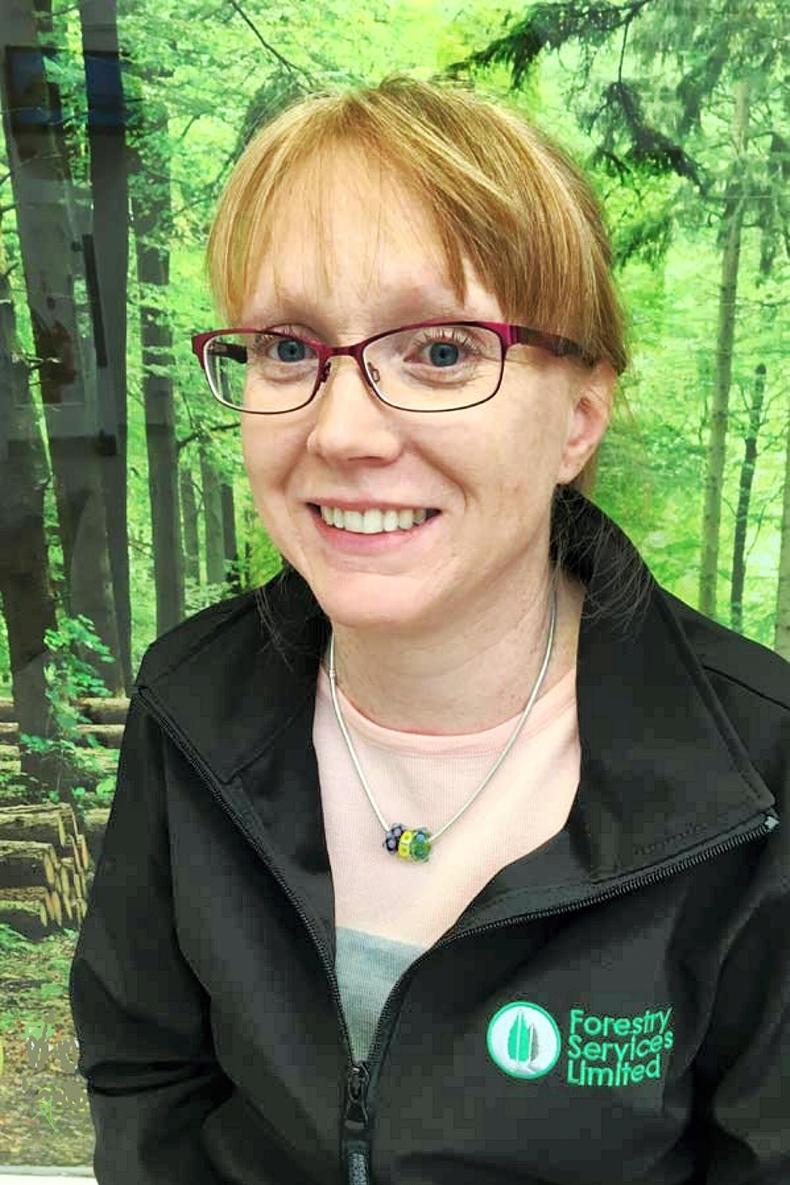
Nicola Whelan, FSL group certification manager, Forestry Services, says forest owners with dual certification "are in control of when and who they sell their timber to, so ultimately are in control of price."
“Certification benefits include flexibility, wider markets and the assurances of providing a premium price for our clients’ logs. At the moment, sawmills dictate price for timber from uncertified forests especially mills that have more than 30% supply of uncertified timber. Forest owners with certification are in control of when and whom they sell their timber to, so ultimately are in control of price.”
FSL, based in Kilkenny “has foresters located throughout the country, so we plan to provide nationwide certification”, said John McGarr, certification manager. “We already have five certification schemes validated by FSC and PEFC in forests such as Cormick and Drumhogan, Co Galway; Knocklead, Co Laois; Knockshanbally, Co Kilkenny and Crohane, Co Tipperary.”
Certification for Arbor and Foraois
Foraois Growth Ltd and Arbor Forest Management Ltd received PEFC Ireland certification recently which covers their Irish portfolio of 4,400ha of forests.
“This portfolio, which comprises 181 individual forest properties spread throughout 16 different counties, is operated locally by Arbor,” said John Roche, managing director.

John McGarr, certification manager, Forestry Services Ltd, plans to provide dual FSC and PEFC forest certification throughout Ireland.
Managed by Dasos Capital Ltd, the Finland-based natural capital investment company, Foraois Growth is the second largest certified private forest owner in Ireland.
“Dasos is committed to sustainable forest management in Europe and elsewhere, and forest certification is a concrete indicator of that,” said Petteri Seppänen, director of Foraois.
“Our mission is to deliver financial returns to our investors on a sustainable basis.
“Achieving certification is a priority for Foraois Growth, whose directors are passionate about ensuring that forests are managed sustainably in accordance with environmental, social and economic requirements,” said John Roche.
“We are delighted that Foraois and Arbor have chosen the PEFC certification route,” said William Merivale, national secretary, PEFC Ireland.
Forest certification is costly so needs to be carried out in group schemes.PEFC and FSC two certification bodies.Certification is proof of sustainable forest management.Better prices for timber from certified forests.
Forest certification is a voluntary environmental process. It leads to independent certification by an internationally recognised certification body that confirms that an area of forest is managed to a defined standard.
It is proof of sustainable forest management (SFM), which is the stewardship of forests to meet economic, environmental and social needs.
Certification is endorsed by two international independent organisations:
Programme for the Endorsement of Forest Certification schemes (PEFC).Forest Stewardship Council (FSC).Certification doesn’t stop at the forest, but applies throughout the forest supply chain, including timber processing, manufacturing, printing and other users of wood.
The main reason for the introduction of certification was to encourage countries around the world to practise SFM especially in the tropics
These receive chain of custody (CoC) certification but they must be able to prove that the timber originated in certified forests.
CoC certification allows them to stamp their products with the PEFC and/or FSC brand. This is proof that products were sourced in sustainably managed forests. The main reason for the introduction of certification was to encourage countries around the world to practise SFM especially in the tropics – including Brazil, where illegal logging is still carried out.
CoC certification is important for Irish wood processors, as these rely on exports. PEFC and FSC stamps are recognised as international marketing as well as environmental brands.
Irish timber processors can receive CoC certification providing at least 70% of their timber is sourced from certified forests. As most timber up until recently was supplied by Coillte – which has certification – there was little incentive for small-scale forest owners to seek certification.
CoC certification is important for Irish wood processors, as these rely on exports
Other major suppliers such as Northern Ireland Forest Service and the Irish Forestry Unit Trust (IForUT) also have certification.
Now, some mills who are at the 70% threshold, can no longer accept non-certified timber if they wish to maintain CoC certification. Forest owners who wish to gain greater market access to CoC certified mills are faced with a major challenge, as they don’t have the economies of scale to achieve certification, which is costly.
There are, however, two cost-effective ways to achieve certification:
Opt for group certification under the aegis of a woodland co-operative or producer group. Opt for certification with a forestry company.Owner group certification
In 2016, the Forest Service invited tenders to begin the process to of achieving group certification.
The North East Forestry Group, based in Meath and the Forestry Owners Cooperative Society, in Cork, took part in a pilot project and achieved certification in 2018. However, retaining certification is proving difficult.
Forest owners who wish to gain greater market access to CoC certified mills are faced with a major challenge, as they don’t have the economies of scale to achieve certification
The North East Forestry Group has retained certification for the 2019/2020 season, but it is likely that the Forest Service will need to fund certification programmes beyond the initial pilot scheme.
Alex Kelly, manager, Irish Wood Producers (IWP), acknowledges the need for group certification.
“We are currently developing plans to work towards certification this year as an increasing number of our sawmill and renewable energy customers require timber from certified forests.”
Group company certification
Group company certification schemes (GCSs) are run by forestry companies that manage and market timber for forest owners.
They have the economies of scale including forester staff to administer group schemes around the country.
Some are already managing forests for individual forest owners or companies including Forestry Services Ltd and Arbor Forest Management Ltd. Both have the advantage of providing marketing and certification expertise.
FSL receives dual PEFC and FSC certification
Forestry Services Ltd (FSL) is the first private company to achieve both FSC and PEFC certification in Ireland. “We offer forest owners a certification scheme to achieve internationally recognised forest management standards,” said Nicola Whelan, FSL group certification manager.

Nicola Whelan, FSL group certification manager, Forestry Services, says forest owners with dual certification "are in control of when and who they sell their timber to, so ultimately are in control of price."
“Certification benefits include flexibility, wider markets and the assurances of providing a premium price for our clients’ logs. At the moment, sawmills dictate price for timber from uncertified forests especially mills that have more than 30% supply of uncertified timber. Forest owners with certification are in control of when and whom they sell their timber to, so ultimately are in control of price.”
FSL, based in Kilkenny “has foresters located throughout the country, so we plan to provide nationwide certification”, said John McGarr, certification manager. “We already have five certification schemes validated by FSC and PEFC in forests such as Cormick and Drumhogan, Co Galway; Knocklead, Co Laois; Knockshanbally, Co Kilkenny and Crohane, Co Tipperary.”
Certification for Arbor and Foraois
Foraois Growth Ltd and Arbor Forest Management Ltd received PEFC Ireland certification recently which covers their Irish portfolio of 4,400ha of forests.
“This portfolio, which comprises 181 individual forest properties spread throughout 16 different counties, is operated locally by Arbor,” said John Roche, managing director.

John McGarr, certification manager, Forestry Services Ltd, plans to provide dual FSC and PEFC forest certification throughout Ireland.
Managed by Dasos Capital Ltd, the Finland-based natural capital investment company, Foraois Growth is the second largest certified private forest owner in Ireland.
“Dasos is committed to sustainable forest management in Europe and elsewhere, and forest certification is a concrete indicator of that,” said Petteri Seppänen, director of Foraois.
“Our mission is to deliver financial returns to our investors on a sustainable basis.
“Achieving certification is a priority for Foraois Growth, whose directors are passionate about ensuring that forests are managed sustainably in accordance with environmental, social and economic requirements,” said John Roche.
“We are delighted that Foraois and Arbor have chosen the PEFC certification route,” said William Merivale, national secretary, PEFC Ireland.
Forest certification is costly so needs to be carried out in group schemes.PEFC and FSC two certification bodies.Certification is proof of sustainable forest management.Better prices for timber from certified forests.






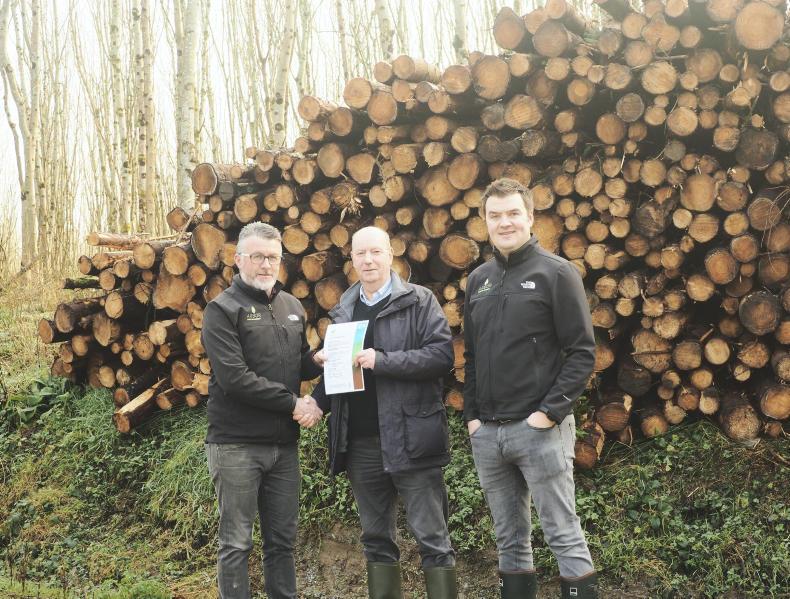
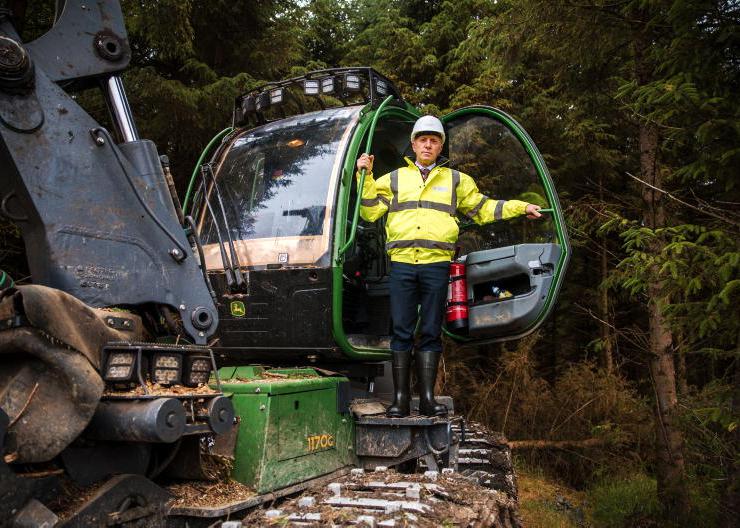

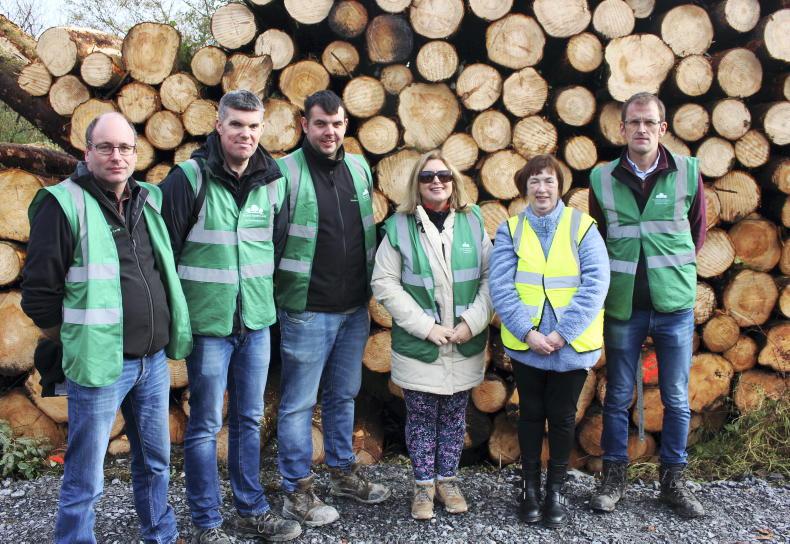
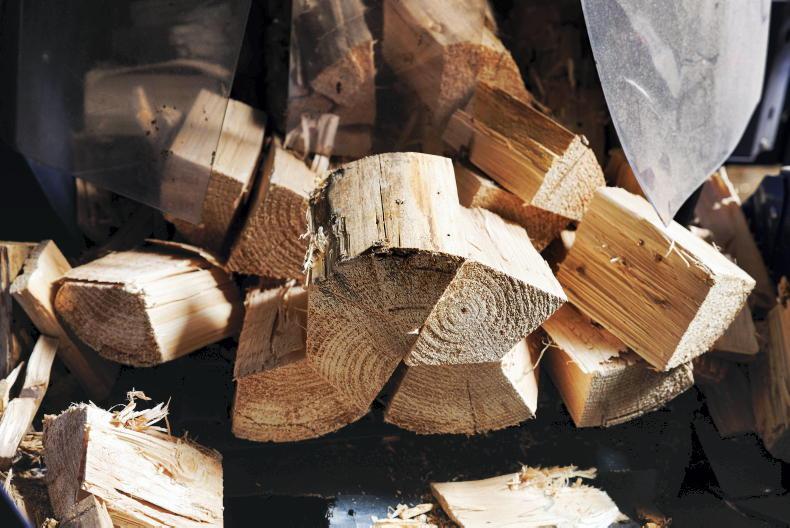
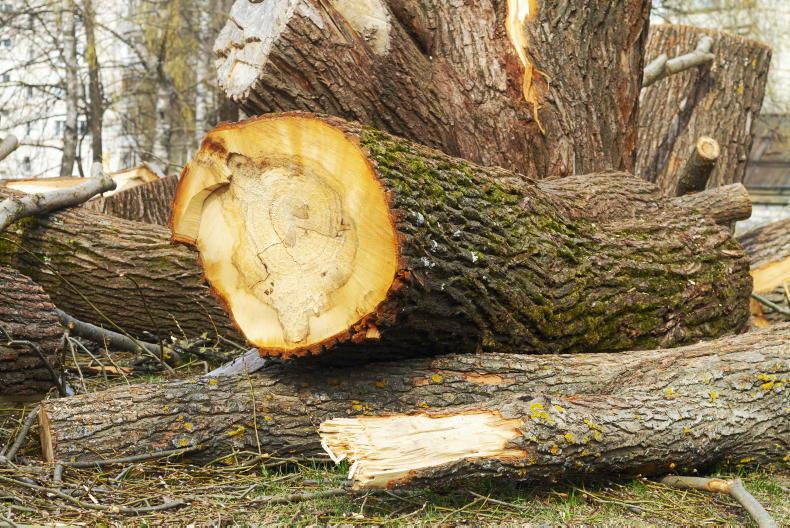
SHARING OPTIONS